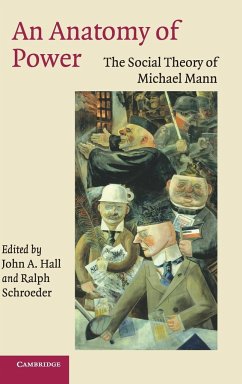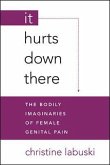- Gebundenes Buch
- Merkliste
- Auf die Merkliste
- Bewerten Bewerten
- Teilen
- Produkt teilen
- Produkterinnerung
- Produkterinnerung
A systematic and critical assessment of the work of Michael Mann, one of the most influential sociologists of recent decades.
Andere Kunden interessierten sich auch für
![An Anatomy of Power An Anatomy of Power]() A. Hall / Ralph Schroeder (eds.)An Anatomy of Power61,99 €
A. Hall / Ralph Schroeder (eds.)An Anatomy of Power61,99 €![Anatomy of the McMartin Child Molestation Case Anatomy of the McMartin Child Molestation Case]() Edgar W. ButlerAnatomy of the McMartin Child Molestation Case126,99 €
Edgar W. ButlerAnatomy of the McMartin Child Molestation Case126,99 €![It Hurts Down There It Hurts Down There]() Christine LabuskiIt Hurts Down There103,99 €
Christine LabuskiIt Hurts Down There103,99 €![Anatomy of Violence Anatomy of Violence]() Belachew GebrewoldAnatomy of Violence126,99 €
Belachew GebrewoldAnatomy of Violence126,99 €![The Anatomy Of Suicide The Anatomy Of Suicide]() Forbes WinslowThe Anatomy Of Suicide18,99 €
Forbes WinslowThe Anatomy Of Suicide18,99 €![Images of Public Wealth or the Anatomy of Well-Being in Indigenous Amazonia Images of Public Wealth or the Anatomy of Well-Being in Indigenous Amazonia]() Images of Public Wealth or the Anatomy of Well-Being in Indigenous Amazonia72,99 €
Images of Public Wealth or the Anatomy of Well-Being in Indigenous Amazonia72,99 €![The Anatomy of Hate The Anatomy of Hate]() Revati LaulThe Anatomy of Hate16,99 €
Revati LaulThe Anatomy of Hate16,99 €-
-
-
A systematic and critical assessment of the work of Michael Mann, one of the most influential sociologists of recent decades.
Hinweis: Dieser Artikel kann nur an eine deutsche Lieferadresse ausgeliefert werden.
Hinweis: Dieser Artikel kann nur an eine deutsche Lieferadresse ausgeliefert werden.
Produktdetails
- Produktdetails
- Verlag: Cambridge University Press
- Seitenzahl: 420
- Erscheinungstermin: 3. März 2016
- Englisch
- Abmessung: 235mm x 157mm x 29mm
- Gewicht: 829g
- ISBN-13: 9780521850001
- ISBN-10: 0521850002
- Artikelnr.: 22391086
- Herstellerkennzeichnung
- Libri GmbH
- Europaallee 1
- 36244 Bad Hersfeld
- gpsr@libri.de
- Verlag: Cambridge University Press
- Seitenzahl: 420
- Erscheinungstermin: 3. März 2016
- Englisch
- Abmessung: 235mm x 157mm x 29mm
- Gewicht: 829g
- ISBN-13: 9780521850001
- ISBN-10: 0521850002
- Artikelnr.: 22391086
- Herstellerkennzeichnung
- Libri GmbH
- Europaallee 1
- 36244 Bad Hersfeld
- gpsr@libri.de
John A. Hall is Dean of the Faculty of Arts at McGill University and James McGill Professor, Department of Sociology. His books include Powers and Liberties (1985), Liberalism (1989), Coercion and Consent (1994) and (with Charles Lindholm) Is America Breaking Apart (2001).
Ralph Schroeder is a Research Fellow at the Oxford Internet Institute at the University of Oxford. His books include Max Weber and the Sociology of Culture (1992) and, as editor, Max Weber, Democracy and Modernization (1998).
Ralph Schroeder is a Research Fellow at the Oxford Internet Institute at the University of Oxford. His books include Max Weber and the Sociology of Culture (1992) and, as editor, Max Weber, Democracy and Modernization (1998).
Introduction: the IEMP model and its critics Ralph Schroeder; Part I.
Theory, Practice, Method: 2. Mann's transformation of the classic
sociological traditions Randall Collins; 3. Political questions John A.
Hall; 4. Mann's microfoundations: addressing neo-Weberian dilemmas Edgar
Kiser; 5. Grand yet grounded: ontology, theory and method in Mann's
historical sociology Joseph Bryant; Part II. Types of Power: 6. Mann's
theory of ideological power: sources, applications and elaborations Philip
Gorski; 7. Political power un-manned: a defence of the holy trinity from
Mann's military attack Gianfranco Poggi; 8. Mann, the state and war John
Hobson; 9. Infrastructural power, economic transformation and globalization
Linda Weiss; Part III. European Exceptionalism?: 10. From theory to
history: 'the European dynamic' or 'from Feudalism to capitalism'? Robert
Brenner; 11. The rise of the west Stephen Epstein; 12. A historical, not
comparative method: breakthroughs and limitations in the theory and
methodology of Michael Mann's analysis of power Jack Goldstone; Part IV.
Promise and Perils of Modernity: 13. The 'British' sources of social power:
reflections on history, sociology, and intellectual biography Frank
Trentmann; 14. Networks and ideologies: the fusion of 'is' and 'ought' as a
means to social power Jack Snyder; 15. Mann's dark side: linking democracy
and genocide David Laitin; Part V. Response: 16. The sources of power
revisited: a response to criticism Michael Mann.
Theory, Practice, Method: 2. Mann's transformation of the classic
sociological traditions Randall Collins; 3. Political questions John A.
Hall; 4. Mann's microfoundations: addressing neo-Weberian dilemmas Edgar
Kiser; 5. Grand yet grounded: ontology, theory and method in Mann's
historical sociology Joseph Bryant; Part II. Types of Power: 6. Mann's
theory of ideological power: sources, applications and elaborations Philip
Gorski; 7. Political power un-manned: a defence of the holy trinity from
Mann's military attack Gianfranco Poggi; 8. Mann, the state and war John
Hobson; 9. Infrastructural power, economic transformation and globalization
Linda Weiss; Part III. European Exceptionalism?: 10. From theory to
history: 'the European dynamic' or 'from Feudalism to capitalism'? Robert
Brenner; 11. The rise of the west Stephen Epstein; 12. A historical, not
comparative method: breakthroughs and limitations in the theory and
methodology of Michael Mann's analysis of power Jack Goldstone; Part IV.
Promise and Perils of Modernity: 13. The 'British' sources of social power:
reflections on history, sociology, and intellectual biography Frank
Trentmann; 14. Networks and ideologies: the fusion of 'is' and 'ought' as a
means to social power Jack Snyder; 15. Mann's dark side: linking democracy
and genocide David Laitin; Part V. Response: 16. The sources of power
revisited: a response to criticism Michael Mann.
Introduction: the IEMP model and its critics Ralph Schroeder; Part I. Theory, Practice, Method: 2. Mann's transformation of the classic sociological traditions Randall Collins; 3. Political questions John A. Hall; 4. Mann's microfoundations: addressing neo-Weberian dilemmas Edgar Kiser; 5. Grand yet grounded: ontology, theory and method in Mann's historical sociology Joseph Bryant; Part II. Types of Power: 6. Mann's theory of ideological power: sources, applications and elaborations Philip Gorski; 7. Political power un-manned: a defence of the holy trinity from Mann's military attack Gianfranco Poggi; 8. Mann, the state and war John Hobson; 9. Infrastructural power, economic transformation and globalization Linda Weiss; Part III. European Exceptionalism?: 10. From theory to history: 'the European dynamic' or 'from Feudalism to capitalism'? Robert Brenner; 11. The rise of the west Stephen Epstein; 12. A historical, not comparative method: breakthroughs and limitations in the theory and methodology of Michael Mann's analysis of power Jack Goldstone; Part IV. Promise and Perils of Modernity: 13. The 'British' sources of social power: reflections on history, sociology, and intellectual biography Frank Trentmann; 14. Networks and ideologies: the fusion of 'is' and 'ought' as a means to social power Jack Snyder; 15. Mann's dark side: linking democracy and genocide David Laitin; Part V. Response: 16. The sources of power revisited: a response to criticism Michael Mann.
Introduction: the IEMP model and its critics Ralph Schroeder; Part I.
Theory, Practice, Method: 2. Mann's transformation of the classic
sociological traditions Randall Collins; 3. Political questions John A.
Hall; 4. Mann's microfoundations: addressing neo-Weberian dilemmas Edgar
Kiser; 5. Grand yet grounded: ontology, theory and method in Mann's
historical sociology Joseph Bryant; Part II. Types of Power: 6. Mann's
theory of ideological power: sources, applications and elaborations Philip
Gorski; 7. Political power un-manned: a defence of the holy trinity from
Mann's military attack Gianfranco Poggi; 8. Mann, the state and war John
Hobson; 9. Infrastructural power, economic transformation and globalization
Linda Weiss; Part III. European Exceptionalism?: 10. From theory to
history: 'the European dynamic' or 'from Feudalism to capitalism'? Robert
Brenner; 11. The rise of the west Stephen Epstein; 12. A historical, not
comparative method: breakthroughs and limitations in the theory and
methodology of Michael Mann's analysis of power Jack Goldstone; Part IV.
Promise and Perils of Modernity: 13. The 'British' sources of social power:
reflections on history, sociology, and intellectual biography Frank
Trentmann; 14. Networks and ideologies: the fusion of 'is' and 'ought' as a
means to social power Jack Snyder; 15. Mann's dark side: linking democracy
and genocide David Laitin; Part V. Response: 16. The sources of power
revisited: a response to criticism Michael Mann.
Theory, Practice, Method: 2. Mann's transformation of the classic
sociological traditions Randall Collins; 3. Political questions John A.
Hall; 4. Mann's microfoundations: addressing neo-Weberian dilemmas Edgar
Kiser; 5. Grand yet grounded: ontology, theory and method in Mann's
historical sociology Joseph Bryant; Part II. Types of Power: 6. Mann's
theory of ideological power: sources, applications and elaborations Philip
Gorski; 7. Political power un-manned: a defence of the holy trinity from
Mann's military attack Gianfranco Poggi; 8. Mann, the state and war John
Hobson; 9. Infrastructural power, economic transformation and globalization
Linda Weiss; Part III. European Exceptionalism?: 10. From theory to
history: 'the European dynamic' or 'from Feudalism to capitalism'? Robert
Brenner; 11. The rise of the west Stephen Epstein; 12. A historical, not
comparative method: breakthroughs and limitations in the theory and
methodology of Michael Mann's analysis of power Jack Goldstone; Part IV.
Promise and Perils of Modernity: 13. The 'British' sources of social power:
reflections on history, sociology, and intellectual biography Frank
Trentmann; 14. Networks and ideologies: the fusion of 'is' and 'ought' as a
means to social power Jack Snyder; 15. Mann's dark side: linking democracy
and genocide David Laitin; Part V. Response: 16. The sources of power
revisited: a response to criticism Michael Mann.
Introduction: the IEMP model and its critics Ralph Schroeder; Part I. Theory, Practice, Method: 2. Mann's transformation of the classic sociological traditions Randall Collins; 3. Political questions John A. Hall; 4. Mann's microfoundations: addressing neo-Weberian dilemmas Edgar Kiser; 5. Grand yet grounded: ontology, theory and method in Mann's historical sociology Joseph Bryant; Part II. Types of Power: 6. Mann's theory of ideological power: sources, applications and elaborations Philip Gorski; 7. Political power un-manned: a defence of the holy trinity from Mann's military attack Gianfranco Poggi; 8. Mann, the state and war John Hobson; 9. Infrastructural power, economic transformation and globalization Linda Weiss; Part III. European Exceptionalism?: 10. From theory to history: 'the European dynamic' or 'from Feudalism to capitalism'? Robert Brenner; 11. The rise of the west Stephen Epstein; 12. A historical, not comparative method: breakthroughs and limitations in the theory and methodology of Michael Mann's analysis of power Jack Goldstone; Part IV. Promise and Perils of Modernity: 13. The 'British' sources of social power: reflections on history, sociology, and intellectual biography Frank Trentmann; 14. Networks and ideologies: the fusion of 'is' and 'ought' as a means to social power Jack Snyder; 15. Mann's dark side: linking democracy and genocide David Laitin; Part V. Response: 16. The sources of power revisited: a response to criticism Michael Mann.
'... an intellectual biography of Mann that illuminates the evolving political goals underpinning his scholarship; it provides a progress report by his peers on the success of the enterprise to date, as well as Mann's response to his critics; and it furnishes clues about how the project will further develop.' Journal of Power








